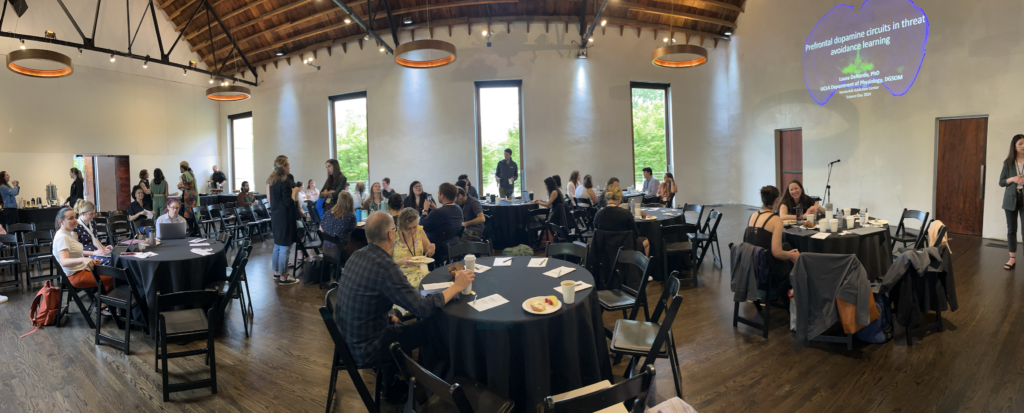 Within the industrial-style doors of Ruby Nashville, an event venue located off the southern end of Vanderbilt’s campus, the Vanderbilt Center for Addiction Research hosted its annual Science Day on April 18.
Within the industrial-style doors of Ruby Nashville, an event venue located off the southern end of Vanderbilt’s campus, the Vanderbilt Center for Addiction Research hosted its annual Science Day on April 18.
“I am super excited about today,” said Erin S. Calipari, director of VCAR, at the start of the day.
VCAR is advancing our understanding of the intricate mechanisms underlying the development of addiction and substance use disorder in the brain, providing community outreach to destigmatize addiction and developing new pharmaceutical strategies to treat addiction. Science Day, which started as an annual event in 2017, features the latest research in addiction, including investigations into alcohol, opioids, and stimulants. “Addiction is a really complex disorder,” said Calipari. “It affects every system in the brain.”
The research highlighted at the event this year focused on a few of those brain systems, delving into the basic mechanisms and systems that drugs are shown to impact.
The event attracted attendees and speakers of the highest caliber in the field of addiction research from top institutions from around the world. From Sydney, Australia, where Mel Sharpe, senior lecturer at the University of Sydney, hails from, to Vanderbilt’s own Perception Plasticity & Learning Lab, where Kari Hoffman, associate professor of psychology, works, and everything in between. Sharpe and Hoffman were both presenters at Science Day.
According to Calipari, the event helped the VCAR team conceptualize how their work fits into “the bigger picture of the brain and how the brain works.”
The day featured three sessions, “Learning and Memory,” “Brain Mechanisms of Reward” and “Circuits of Social Behavior,” that were chaired by a some of VCAR’s own graduate students and fellows. Graduate student Kirsty Erickson, who chaired the second session on brain mechanisms and reward, calls herself the “resident bartender and cocaine dealer to the mice.”
Research from the School of Medicine Basic Sciences was featured throughout the day. Maxime Chevee, a postdoctoral fellow who joined the Calipari lab in August 2020, where he studies the neural mechanisms underlying habit formation, gave a presentation on food restriction and its effects on region-specific dopamine release to promote learning.
Michelle Bedenbaugh, research assistant professor in the Department of Molecular Physiology and Biophysics who will soon be moving on to the University of Florida to start her own lab, discussed the sexually dimorphic effects of the melanocortin 3 receptor network on feeding and stress, but not anxiety behaviors.
The last Basic Sciences graduate student to present her work was Zahra Farahbakhsh from the lab of Cody Siciliano, assistant professor of pharmacology, who discussed phenotypic screening of a type of opioid receptor in a preclinical model of alcohol use disorder.
Calipari also made sure to emphasize VCAR’s small but mighty team, which includes grad students and postdoctoral fellows. “This group is not that big … but [we are] accomplishing great things,” she said. Recently, the National Institutes of Health awarded Calipari and colleagues a five-year, nearly $9 million grant that will help establish the Vanderbilt AUD Research and Education Center, which will advance Vanderbilt’s leadership in neuroscience, addiction research, and new approaches to studying alcohol use disorder.
“This [grant] is going to be a really great opportunity for us to collaborate together and have other people come to the alcohol field,” Calipari said. To the event’s participants, she added, “We are so excited to partner with you to do that.”
Exciting initiatives are ahead for Vanderbilt’s community of addiction researchers, but the last five years have been impactful for VCAR’s labs. “You guys have been killing it, so thank you,” Calipari said to the attendees.
VCAR is supported by Discovery Vanderbilt, an initiative of the Office of the Provost and one of three pathways in theVanderbilt’s Dare to Grow campaign, established to support and extend the resources underpinning Vanderbilt’s most innovative research and education.